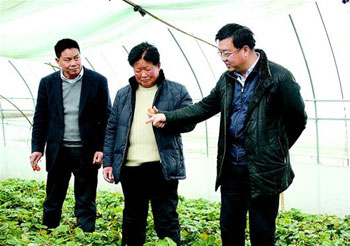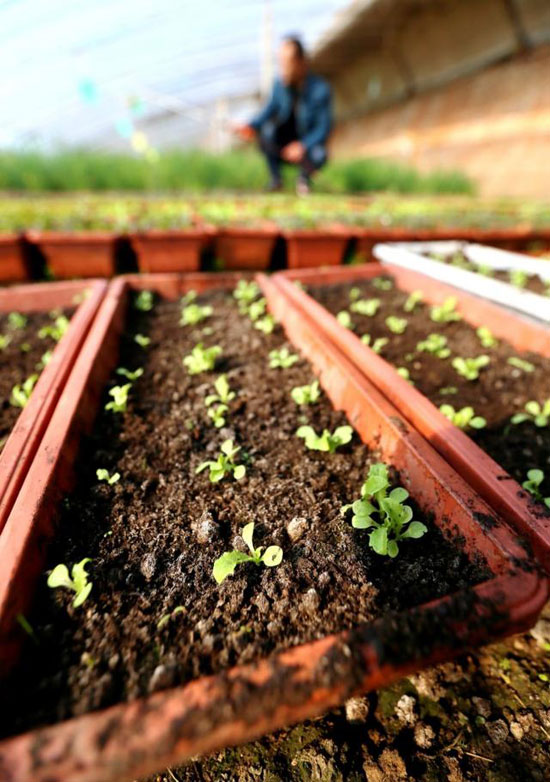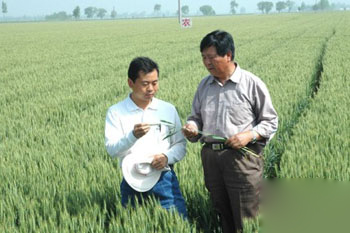Three generations of "Grain King" on why it is better to grow grain than to grow grain
Original title: "Grain King" growing Grain in early Spring

Tan Lunwei (first from right) is introducing strawberry cultivation to Wu Huaping (first from left) and Liu Wenbao (middle). (source of online pictures: photo by Jiang Yuebo, reporter of Hubei Daily)
On February 17, the 10th day of the first lunar month, Liu Wenbao, the "first generation grain king", and Wu Huaping, the "top ten farmers in the country" made a special trip to the Chunhui Agricultural Cooperative in Xiaonan District, Xiaogan City, Hubei Province. they visited Tan Lunwei, deputy to the 12th National people's Congress and chairman of the Chunhui cooperative. New year's words were new, and the common grain-growing cause made the three "grain kings" very familiar with each other.
In his twilight years, Liu Wenbao was a typical representative of the first large-scale operation in the early days of China's rural reform. in 1989, he walked into Zhongnanhai from the ridges of Xiangyang, Hubei Province, and became the "king of grain" praised by the leaders of the State Council at that time. Over the years, he has been unswervingly determined to grow tens of thousands of mu of grain in Hubei, Ningxia and other places through ups and downs.
Lao Liu first opened the chatterbox and reviewed the non-agricultural industries he had invested in in recent years. The benefits were mediocre. He felt that "he had grown grain all his life, but now he would be uncomfortable if he did not grow it, but he still wanted to return to agriculture." Last year, he took his two sons to Inner Mongolia and other places to inspect, preparing to develop deserts and grow grain again. This time, he came to Chunhui to see if there was any land suitable for subcontracting. However, Lao Liu also pointed out that if you rely solely on family management, it will be very difficult to become bigger and stronger. If you want to grow good grain on a large scale, you must not only think quickly, but also rely on economic strength.
"Last year, grain prices were mediocre. On the face of it, it was a crisis for ordinary farmers and an opportunity for Huafeng co-operatives." Wu Huaping, a 53-year-old native of Tianmen, Hubei Province, was named "Top Ten Farmers in China" by the Ministry of Agriculture at the beginning of this year. For more than 30 years, Wu Huaping has not left the word "agriculture". He said that in the past, cooperatives begged farmers to transfer land, but now farmers take the initiative to find cooperatives to transfer land.
Why is this happening? isn't it because the co-operatives have good benefits! Wu Huaping, who was awarded as a "national grain grower and seller" by the State Council, has led Huafeng agricultural cooperatives after 10 years of development, with cooperatives leading large families to grow grain as the main mode of operation, and has transferred more than 80, 000 mu of land, with an average annual income of 86000 yuan. Wu Huaping said: selenium-rich rice and ratooning rice are the main products for the future development of fine grain in cooperatives, and projects such as the combination of planting and cultivation, straw utilization, and overseas grain cultivation are being discussed and implemented.
"on the land transferred by Chunhui, growing grain is still the main business." The Chunhui Group founded by Tan Lunwei, who is less than 48 years old, is a large private enterprise with "the combination of industry and agriculture, the integration of urban and rural areas, and the integration of one, two and three industries". In 2010, relying on Chunhui rice industry as the leader, the implementation of the "Chunhui model" of land management and transfer of "enterprises + cooperatives" is known as a flag of modern agriculture in Hubei. In recent years, farming has reached about 100000 mu, and it is a new generation of "grain king" in Hubei.
"No matter how the market situation changes, the guaranteed rent of 360 jin of medium indica rice per mu promised by Chunhui to farmers will not change." Tan Lunwei frankly admitted that in the research activities organized by the National people's Congress, he found that in the current grain market, the costs of labor and means of production only go up, and the pressure on growing grain is increasing. Chunhui also depends on the development of comprehensive agricultural projects to subsidize fields that simply grow food crops.
Tan Lunwei said that since 2012, Chunhui has gradually adjusted its grain planting structure, first optimizing grain varieties, changing from ordinary medium rice to high-quality rice, and then adjusting low-yielding areas of rice such as mountains and hills to growing cash crops such as vegetables, melons and fruits, and developing forestry, aquaculture, sightseeing and leisure agriculture, and taking advantage of the opportunity to create a landscape of Chunhui Modern Agricultural Expo Park has begun to take shape. (our reporter he Hongwei Le Mingkai Hubei Daily reporter Jiang Yuebo)
- Prev

The temperature in Shandong Province warms up quickly, that is, ink and pots sell vegetables.
The temperature in Shandong Province warms up quickly, that is, ink and pots sell vegetables.
- Next

A Memory of Characteristics of Wheat Breeding for Half a Century by Wang Hui
A Memory of Characteristics of Wheat Breeding for Half a Century by Wang Hui
Related
- A course of planting techniques and methods on how to grow carrots
- How to plant the latest tulips?
- Is it better to pick tea in the morning or in the afternoon? When is the best time for tea to be picked? what is the third or fifth tea?
- Launch Yuanxiao Happy combination Haocha + Tea Yuan healthy Taste
- Penghu Tourism "Fireworks 20 Parade with You"
- 2022 West Lake Happiness holds "Digital Revitalization Voucher" and draws iphone13 and laptop.
- Banqiao Fuzhou social houses are designed to change start-up combined with police elimination to create a safe and livable environment
- The convenient measure of "mechanical weeding" in Xinbei has been abused and the Agriculture Bureau has imposed heavy penalties on the illegal land consolidation.
- Changgeng University Joins Hands with Four Memory Factories to Rescue Memory Talent Shortage
- The list of Taiwan's top 100 MVP managers is listed by the Director-General of the Farmers' Association of Sanxia District.

